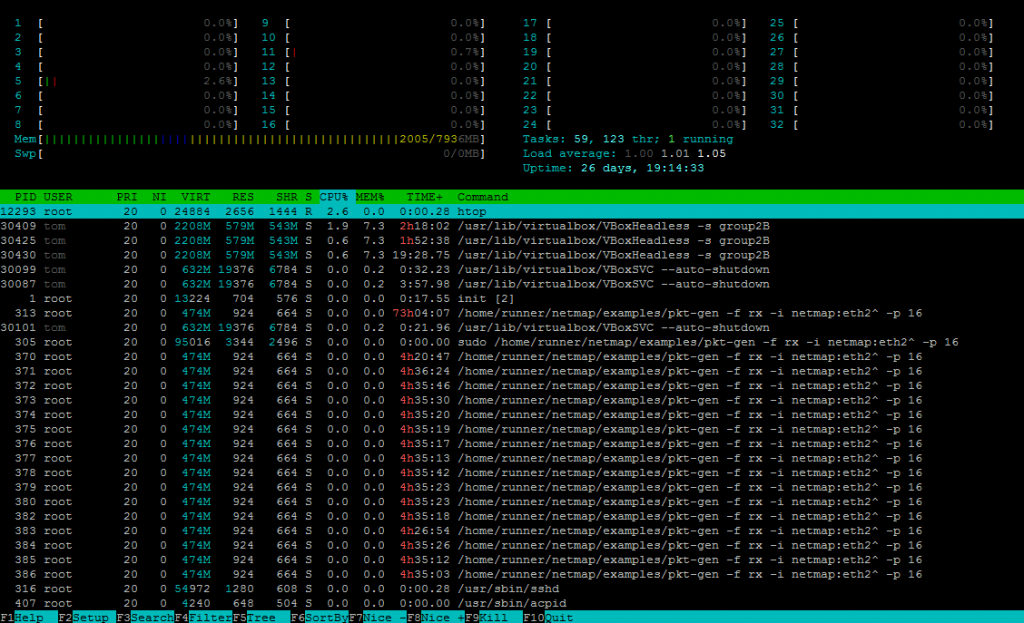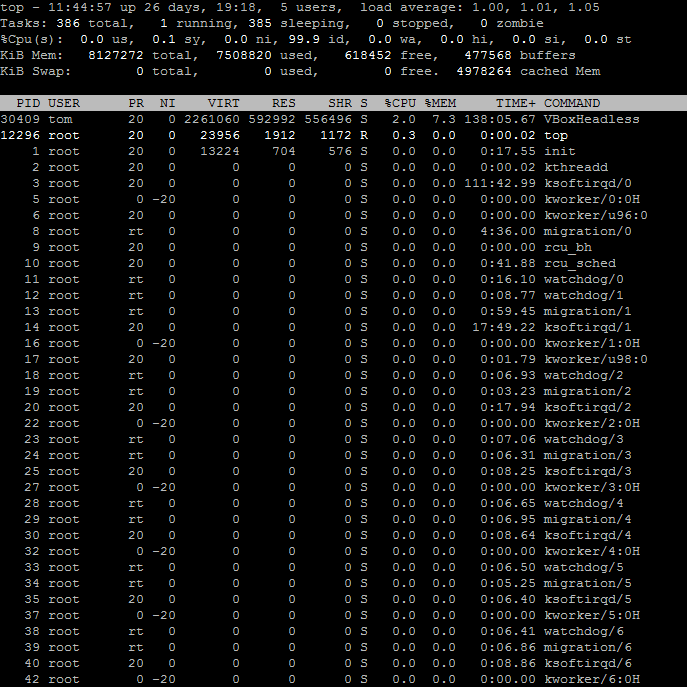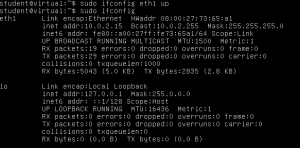This is a modification of the program chrt (used to change the policy of a process) which has no external dependencies. It can be compiled using “gcc -o chrt chrt.c”.
[code]/*
* chrt.c - chrt
* Command-line utility for manipulating a task's real-time attributes
*
* Robert Love <rml@tech9.net>
* 27-Apr-2002: initial version
*
* This program is free software; you can redistribute it and/or modify
* it under the terms of the GNU General Public License, v2, as
* published by the Free Software Foundation
*
* This program is distributed in the hope that it will be useful,
* but WITHOUT ANY WARRANTY; without even the implied warranty of
* MERCHANTABILITY or FITNESS FOR A PARTICULAR PURPOSE. See the
* GNU General Public License for more details.
*
* You should have received a copy of the GNU General Public License
* along with this program; if not, write to the Free Software
* Foundation, Inc., 675 Mass Ave, Cambridge, MA 02139, USA.
*
* Copyright (C) 2004 Robert Love
*/
#include <stdio.h>
#include <stdlib.h>
#include <sched.h>
#include <unistd.h>
#include <getopt.h>
#include <errno.h>
#include <err.h>
#define PACKAGE_STRING "modified for greentask"
#define FALSE 0
#define TRUE 1
/* the SCHED_BATCH is supported since Linux 2.6.16
* -- temporary workaround for people with old glibc headers
*/
#if defined (__linux__) && !defined(SCHED_BATCH)
# define SCHED_BATCH 3
#endif
/* the SCHED_IDLE is supported since Linux 2.6.23
* commit id 0e6aca43e08a62a48d6770e9a159dbec167bf4c6
* -- temporary workaround for people with old glibc headers
*/
#if defined (__linux__) && !defined(SCHED_IDLE)
# define SCHED_IDLE 5
#endif
#if defined(__linux__) && !defined(SCHED_RESET_ON_FORK)
#define SCHED_RESET_ON_FORK 0x40000000
#endif
#define SCHED_GREEN 6
#define ARRAY_SIZE(x) (sizeof(x) / sizeof((x)[0]))
char* _(char* s) {
return s;
}
long strtol_or_err(const char *str, const char *errmesg)
{
long num;
char *end = NULL;
if (str != NULL && *str != '\0') {
errno = 0;
num = strtol(str, &end, 10);
if (errno == 0 && str != end && end != NULL && *end == '\0')
return num;
}
error(EXIT_FAILURE, errno, "%s: '%s'", errmesg, str);
return 0;
}
static void __attribute__((__noreturn__)) show_usage(int rc)
{
FILE *out = rc == EXIT_SUCCESS ? stdout : stderr;
fprintf(out, _(
"\nchrt - manipulate real-time attributes of a process\n"
"\nSet policy:\n"
" chrt [options] <policy> <priority> {<pid> | <command> [<arg> ...]}\n"
"\nGet policy:\n"
" chrt [options] {<pid> | <command> [<arg> ...]}\n"));
fprintf(out, _(
"\nScheduling policies:\n"
" -b | --batch set policy to SCHED_BATCH\n"
" -f | --fifo set policy to SCHED_FIFO\n"
" -i | --idle set policy to SCHED_IDLE\n"
" -o | --other set policy to SCHED_OTHER\n"
" -g | --green set policy to SCHED_GREEN\n"
" -r | --rr set policy to SCHED_RR (default)\n"));
#ifdef SCHED_RESET_ON_FORK
fprintf(out, _(
"\nScheduling flags:\n"
" -R | --reset-on-fork set SCHED_RESET_ON_FORK for FIFO or RR\n"));
#endif
fprintf(out, _(
"\nOptions:\n"
" -h | --help display this help\n"
" -m | --max show min and max valid priorities\n"
" -p | --pid operate on existing given pid\n"
" -v | --verbose display status information\n"
" -V | --version output version information\n\n"));
exit(rc);
}
static void show_rt_info(pid_t pid, int isnew)
{
struct sched_param sp;
int policy;
/* don't display "pid 0" as that is confusing */
if (!pid)
pid = getpid();
policy = sched_getscheduler(pid);
if (policy == -1)
err(EXIT_FAILURE, _("failed to get pid %d's policy"), pid);
if (isnew)
printf(_("pid %d's new scheduling policy: "), pid);
else
printf(_("pid %d's current scheduling policy: "), pid);
switch (policy) {
case SCHED_OTHER:
printf("SCHED_OTHER\n");
break;
case SCHED_FIFO:
printf("SCHED_FIFO\n");
break;
#ifdef SCHED_RESET_ON_FORK
case SCHED_FIFO|SCHED_RESET_ON_FORK:
printf("SCHED_FIFO|SCHED_RESET_ON_FORK\n");
break;
#endif
#ifdef SCHED_IDLE
case SCHED_IDLE:
printf("SCHED_IDLE\n");
break;
#endif
#ifdef SCHED_IDLE
case SCHED_GREEN:
printf("SCHED_GREEN\n");
break;
#endif
case SCHED_RR:
printf("SCHED_RR\n");
break;
#ifdef SCHED_RESET_ON_FORK
case SCHED_RR|SCHED_RESET_ON_FORK:
printf("SCHED_RR|SCHED_RESET_ON_FORK\n");
break;
#endif
#ifdef SCHED_BATCH
case SCHED_BATCH:
printf("SCHED_BATCH\n");
break;
#endif
default:
printf(_("unknown\n"));
}
if (sched_getparam(pid, &sp))
err(EXIT_FAILURE, _("failed to get pid %d's attributes"), pid);
if (isnew)
printf(_("pid %d's new scheduling priority: %d\n"),
pid, sp.sched_priority);
else
printf(_("pid %d's current scheduling priority: %d\n"),
pid, sp.sched_priority);
}
static void show_min_max(void)
{
int i;
int policies[] = { SCHED_OTHER, SCHED_FIFO, SCHED_RR,
#ifdef SCHED_BATCH
SCHED_BATCH,
#endif
#ifdef SCHED_IDLE
SCHED_IDLE,
#endif
#ifdef SCHED_GREEN
SCHED_GREEN,
#endif
};
const char *names[] = { "OTHER", "FIFO", "RR",
#ifdef SCHED_BATCH
"BATCH",
#endif
#ifdef SCHED_IDLE
"IDLE",
#endif
#ifdef SCHED_GREEN
"GREEN",
#endif
};
for (i = 0; i < ARRAY_SIZE(policies); i++) {
int max = sched_get_priority_max(policies[i]);
int min = sched_get_priority_min(policies[i]);
if (max >= 0 && min >= 0)
printf(_("SCHED_%s min/max priority\t: %d/%d\n"),
names[i], min, max);
else
printf(_("SCHED_%s not supported?\n"), names[i]);
}
}
int main(int argc, char *argv[])
{
int i, policy = SCHED_RR, priority = 0, verbose = 0, policy_flag = 0;
struct sched_param sp;
pid_t pid = -1;
static const struct option longopts[] = {
{ "batch", 0, NULL, 'b' },
{ "fifo", 0, NULL, 'f' },
{ "idle", 0, NULL, 'i' },
{ "pid", 0, NULL, 'p' },
{ "help", 0, NULL, 'h' },
{ "max", 0, NULL, 'm' },
{ "other", 0, NULL, 'o' },
{ "rr", 0, NULL, 'r' },
{ "green", 0, NULL, 'g' },
{ "reset-on-fork", 0, NULL, 'R' },
{ "verbose", 0, NULL, 'v' },
{ "version", 0, NULL, 'V' },
{ NULL, 0, NULL, 0 }
};
while((i = getopt_long(argc, argv, "+bfgiphmoRrvV", longopts, NULL)) != -1)
{
int ret = EXIT_FAILURE;
switch (i) {
case 'b':
#ifdef SCHED_BATCH
policy = SCHED_BATCH;
#endif
break;
case 'f':
policy = SCHED_FIFO;
break;
#ifdef SCHED_RESET_ON_FORK
case 'R':
policy_flag |= SCHED_RESET_ON_FORK;
break;
#endif
case 'i':
#ifdef SCHED_IDLE
policy = SCHED_IDLE;
#endif
break;
case 'g':
#ifdef SCHED_GREEN
policy = SCHED_GREEN;
#endif
break;
case 'm':
show_min_max();
return 0;
case 'o':
policy = SCHED_OTHER;
break;
case 'p':
errno = 0;
pid = strtol_or_err(argv[argc - 1], _("failed to parse pid"));
break;
case 'r':
policy = SCHED_RR;
break;
case 'v':
verbose = 1;
break;
case 'V':
printf("chrt (%s)\n", PACKAGE_STRING);
return 0;
case 'h':
ret = EXIT_SUCCESS;
default:
show_usage(ret);
}
}
if (((pid > -1) && argc - optind < 1) || ((pid == -1) && argc - optind < 2))
show_usage(EXIT_FAILURE);
if ((pid > -1) && (verbose || argc - optind == 1)) {
show_rt_info(pid, FALSE);
if (argc - optind == 1)
return EXIT_SUCCESS;
}
errno = 0;
priority = strtol_or_err(argv[optind], _("failed to parse priority"));
#ifdef SCHED_RESET_ON_FORK
/* sanity check */
if ((policy_flag & SCHED_RESET_ON_FORK) &&
!(policy == SCHED_FIFO || policy == SCHED_RR))
errx(EXIT_FAILURE, _("SCHED_RESET_ON_FORK flag is suppoted for "
"SCHED_FIFO and SCHED_RR policies only"));
#endif
policy |= policy_flag;
if (pid == -1)
pid = 0;
sp.sched_priority = priority;
if (sched_setscheduler(pid, policy, &sp) == -1)
err(EXIT_FAILURE, _("failed to set pid %d's policy"), pid);
if (verbose)
show_rt_info(pid, TRUE);
if (!pid) {
argv += optind + 1;
execvp(argv[0], argv);
printf("FINIIISHED\n");
perror("execvp");
err(EXIT_FAILURE, _("failed to execute %s"), argv[0]);
}
return EXIT_SUCCESS;
}[/code]





